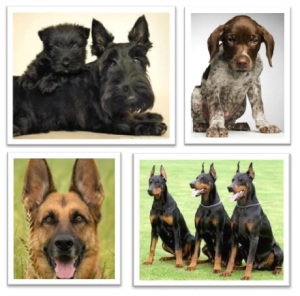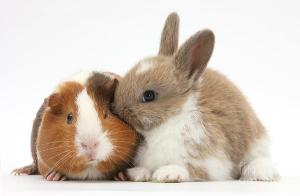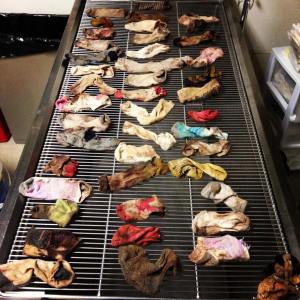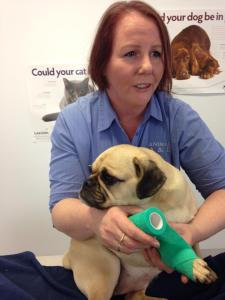
Von Willebrand’s disease is a genetic bleeding disorder that is found in all breeds of dogs, but more commonly in certain breeds, such as Dobermans, Rottweilers, Scottish Terriers, German Shepherds and German Short Haired pointers. It is caused by a deficiency in a specific blood clotting factor that helps platelets to bind broken blood vessels and start to form a blood clot. Without veterinary treatment, von Willebrand’s disease can be life threatening when the pet’s body needs to deal with any form of internal or external bleeding. When this blood clotting factor deficiency is present (known as the von Willebrand factor), even a small injury can lead to excessive blood loss and potentially anaemia, as the blood is unable to clot normally.
While the specific clinical signs for von Willebrand’s disease aren’t always obvious for pet owners to spot, any sign of excessive bleeding should be treated as an animal emergency and the pet needs to be taken to a 24 hour vet clinic immediately. Also, while pets are born with this disease present in their body, they may not show any effects of the bleeding disorder until later in life when they have a surgery or injury that causes bleeding.
The most common clinical signs that may be seen are:
- Excessive bleeding from injuries/lacerations
- Sudden bleeding from the nose, gums or vagina
- Blood present in urine
- Excessive bleeding after females give birth
- Prolonged bleeding after veterinary procedures/surgery
When veterinarians suspect that pets may have von Willebrand’s disease, the most common diagnostic test performed is the buccal mucosal bleeding time. This tests how well blood clotting platelets are working by by making a small incision in the pet’s gum and timing how long it takes for the bleeding to stop. Blood tests are also used to check how much of the von Willebrand’s factor is present in the blood.
When the disease becomes an emergency situation, 24hr emergency vets will often need to use plasma transfusions to stabilise the pet and return clotting factors to the bloodstream. Blood transfusions may also be required if there has been significant blood loss. After transfusions, animals will generally need to remain in a 24 hour pet hospital for ongoing monitoring and care, as well as potentially more transfusions.
There is unfortunately no cure for von Willebrand’s disease. However, it is still highly important to know if the disease is present in pets, especially Dobermans (as they are particularly prone to the disease), as this is crucial information if pets ever require surgery or if any sudden injuries occur. Owners of pets with von Willebrand’s disease can also help to prevent any excessive bleeding crisis’ from happening by avoiding high levels of stress and particular medications when possible, as these can worsen the effects of the disorder. While von Willebrand’s disease cannot be cured, most pets with this condition can still go on to lead long, happy and completely normal lives with the appropriate veterinary care.
Animal Accident & Emergency have two 24 hour pet emergency centres in Melbourne, which are ideally located in Essendon and Point Cook – both with easy freeway access and ample parking. Our animal hospitals are open 24 hours a day, 365 days a year (including public holidays), and offer all the latest equipment and state of the art technology, as well as a 24 hour intensive care unit. Our dedicated team of emergency vets and nurses provide the highest standards of emergency vet care, critical care medicine and surgery, and are experienced in treating every vet emergency from right across Melbourne, Geelong and Ballarat. So when you bring your pet to Animal Accident & Emergency you can rest assured that they will receive the best and most advanced vet care available.
If you believe your pet may be have von Willebrand’s disease, or for any veterinarian emergency, please phone one of our 24 hour animal emergency centres:
Essendon Fields (03) 9379 0700
Point Cook (03) 8368 7400
We’re Always Open, Always Care

www.animalemergency.com.au








